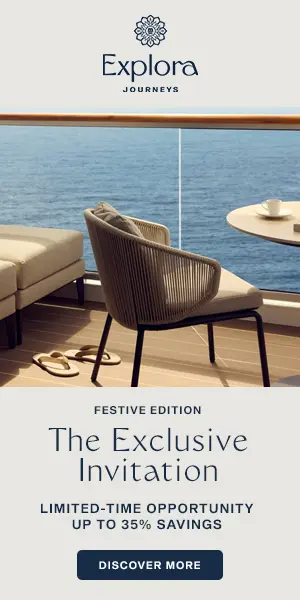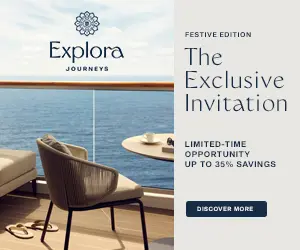Zarmati Comes Home to Carnival
by Donna TunneyVeteran Carnival Corp. executive Maurice Zarmati recently became a marketing consultant to Fathom, Carnival’s new social impact travel brand, which will offer cultural/educational cruise products from Miami to the Dominican Republic and Cuba starting next spring.
TMR talked with Zarmati about the brand, its relationship with agents, and its marketing strategy.
TMR: You retired in 2011 after more than four decades as a top sales executive with Carnival Cruise Line, and then as president and CEO-North America of Costa Cruises. How did this new assignment with Fathom come about?
Maurice Zarmati: When you spend 45 years someplace and then all of a sudden that changes, well, I’ll tell you, I missed it. I’d been consulting as an independent, and a while back Carnival Corp. reached out to me about Fathom and said, “Hey, are you interested?” I feel like I’m making a positive contribution with this new product. This assignment is interesting, it’s never been done before, and coming back to Carnival Corp. is like coming back to my family.
TMR: Is Fathom facing more marketing challenges than perhaps it initially envisioned?
MZ: Rather than challenges — I’m a very positive thinker — I’d say its opportunities. Who doesn’t want to go to Cuba? You mention Cuba and a cruise ship, and it’s not a difficult sell. But Fathom has to be sold as a social impact experience with a cruise ship as the hotel. And we do need to speak up about the ship, the Adonia, which is reasonably new, has balcony cabins, is a nice, sexy ship and will be operated by the P&O brand.
I was talking with an agent not long ago and he asked are we going to have a bar on the ship, will the spa be open, and will it be sit-down dinners or just buffets? And I thought to myself holy moly, we need to make sure agents know that, of course, it’s going to provide all of those things.
TMR: What role will travel agents play in Fathom’s future?
MZ: We want travel agents to be our primary ambassadors. We may take some business through other channels but the lion’s share will come from the largest agencies and consortia in the industry. When we approached them they were very open to wanting to do business with us because it’s such a unique product. Now we have to go in and teach the heads of these consortia about Fathom, what it is, how to sell it, so they can teach their agents how to sell it to clients.
We just signed with Signature, and we’re working with CruisePlanners, CruiseOne and other partners whom we know well. So we’re not starting from ground zero. We’re going to capitalize on the relationships these groups already have with other Carnival brands.
And we will have fam trips, we’ll have road shows. In fact, the Adonia will be in Port Canaveral early in November for trade functions, so agents can see it, and then in Miami for more trade events.
TMR: What is the commission structure?
MZ: At this point we’re at a 15% standard, and for the players who really want to play in the sandbox, there’ll be some back-end (bonus) commissions, plus marketing assistance. The 15% is an inaugural rollout rate, and it has some time limitation on it, but my sense is that if it’s highly profitable and increases traffic, Fathom will maintain that level.
TMR: Who are the clients Fathom most hopes to attract?
MZ: This product is a combination program of social-impact activities, which means you might make water filters in the Dominican Republic in the morning and then have lunch at the home of a local family. But then you might enjoy sitting by the pool at Carnival Corp’s new Amber Cove in the afternoon.
We’re looking for purposeful Millennials, 36 to 38 years old, families with children, and the 50-plus multigenerational family group. Also, we want younger people to book Fathom trips. We recently met with Lynn University, which wants to include us in its program where you have to do a certain number of service hours. It’s the kind of product that will be advertised in Smithsonian magazine rather than in a more tourist/destination kind of consumer magazine.
TMR: How can agents identify clients who would be a good fit for Fathom?
MZ: People who have previously asked about volun-tourism opportunities could be interested in the Fathom program, plus church groups, social groups, really any type of person or group that is philanthropic-minded. Agents should try to identify customers who give back to society. Think of the people who help out at the soup kitchen or who donate to a cause. Fathom is going to allow them the opportunity to donate via a trip. That, to me, is something very special. Agents ask their clients, “How would you like to go to a fundraiser for seven days?”
TMR: Are you going to try the program yourself?
MZ: I am very soon heading to the Dominican Republic to experience the experience for myself. They are going to show us the whole program, what people will be doing. I think it’s going to open my eyes about how much help is needed there.
TMR: Has the Cuban government given the thumbs-up to Fathom yet?
MZ: We believe that approval is imminent. There have been many conversations, many meetings in Washington, D.C., and other places. They want to be sure we are going to follow their rules and regulations, which we are. The Dominican Republic program is pretty much in place, and once Cuba’s approval comes in, you’ll see the floodgates open.




























